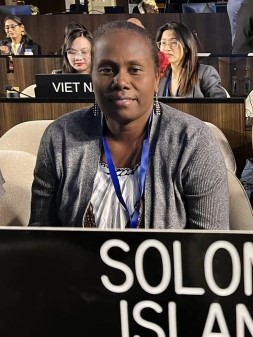
15 November 2023, Nairobi Kenya - Financial assistance that is sustainable, adequate, easily accessible, new, stable, predictable and timely for countries worst impacted by the plastic crisis, like all Pacific countries, is a key means of implementation should a treaty on plastics come into existence.
This is what 14 Pacific Small Islands Developing States (PSIDS) who are amplifying the One Pacific Voice calling for a treaty on plastics, urgently, have told the third session of the Intergovernmental Negotiating Committee to develop an international legally binding instrument on plastic pollution, including in the marine environment (INC-3).
“We continue to face challenges of accessing multilateral funding to support national activities to meet obligations under multilateral environmental agreements (MEAs). As such, the implementation of this instrument relies on a financial mechanism that provides financial assistance that is sustainable, adequate, easily accessible, new, stable, predictable and timely.”
Ms Debra Kereseka, the Deputy Director of Environment in the Solomon Islands, delivered a statement on behalf of PSIDS on implementing measures, where she identified financing as a key issue.
“Financing is a key means of implementation to meet the commitments and obligations of this instrument and to ensure just transition for affected populations with special consideration for women and vulnerable groups, including children and youth, in the implementation plan of this instrument,” said Ms Kereseka.

“The Pacific region faces substantial life-threatening impacts due to the indiscriminate and transboundary flow of plastics that are not created in our island countries. Our marine and terrestrial ecosystems face degradation culminating in the destruction of nearly 700 species in the marine environment, causing irreparable harm to these ecosystems that are critical to the survival of our natural environment and biodiversity.”
The PSIDS statement also highlighted the commitment by all Pacific Leaders to end plastic pollution. For example, ending plastic pollution is one of the key priorities embodied in the 2050 Strategy for the Blue Pacific Continent which sets out the region’s approach to collectively work together to achieve the long-term vision and aspirations through seven key thematic areas. The Implementation Plan for the 2050 Strategy for the Blue Pacific Continent was approved during the 52nd Pacific Islands Forum Leaders Meeting in the Cook Islands.
The Cleaner Pacific 2025 is another long term strategy which provides integrated waste management and pollution prevention and control designed to reduce associated threats to sustainable development of the region.
“These regional frameworks are our platforms to launch the implementation of this instrument to end plastic pollution with the necessary means of implementation such as financing,” said Ms Kereseka.
INC-3, taking place at the United Nations Environment Programme (UNEP) headquarters in Nairobi, marks the mid-point of the journey towards a global treaty. It follows two earlier rounds of negotiations: INC-1, which took place in Punta del Este, Uruguay, in November 2022, and INC-2, which was held in Paris in June. Two more INC sessions are planned for 2024, in Canada and Korea.
For Monday and Tuesday this week, delegates engaged in the main plenary. This was followed by the establishment of three contact groups to address different sections of the Zero Draft and elements of the Synthesis Report. Financing is one of the key issues.
“As PSIDS, we generally support the text under the heading of “Financing” in Part III of the Zero Draft Text, particularly the text on circumstances of Small Island Developing States (SIDS). We continue to consider what the sources of funding for the Financial Mechanism should be, including whether developed country Parties should be obligated to provide funding, major plastic-producing country Parties should take the lead, or whether there should be contributions by all Parties based on a scale of assessments, among other options,” the PSIDS statement reads.
“We do support the text in common paragraph 9 that imposes a plastic pollution fee on plastic polymer producers. On funding mechanisms, early access to funding and dedicated access to the mechanism by SIDS are of paramount importance. We are open to discussion on how to best accomplish this.
“Such activities that would require immediate support at the entry into force of this instrument are institutional strengthening, just transition, policy and legislative development or review, capacity building, awareness-raising, training and education, technology transfer and technology transfer measures, monitoring and reporting.”
The third Intergovernmental Negotiating Committee to develop an international legally binding instrument on plastic pollution, including in the marine environment is taking place in Nairobi Kenya from 13 - 19 November 2023.
The Pacific Islands are represented by the Cook Islands, Federated States of Micronesia, Fiji, Kiribati, Marshall Islands, Nauru, Niue, Palau, Papua New Guinea, Samoa, Solomon Islands, Tonga, Tuvalu and Vanuatu through the support of the Government of Australia and the United Nations.
They are supported by the Secretariat of the Pacific Regional Environment Programme (SPREP), working with partners the Pacific Islands Forum Secretariat, Office of the Pacific Ocean Commissioner, Environmental Investigation Agency, Centre for International Environmental Law, University of Wollongong, WWF and Massey University.
For more information on INC-3, visit: https://www.unep.org/inc-plastic-pollution/session-3